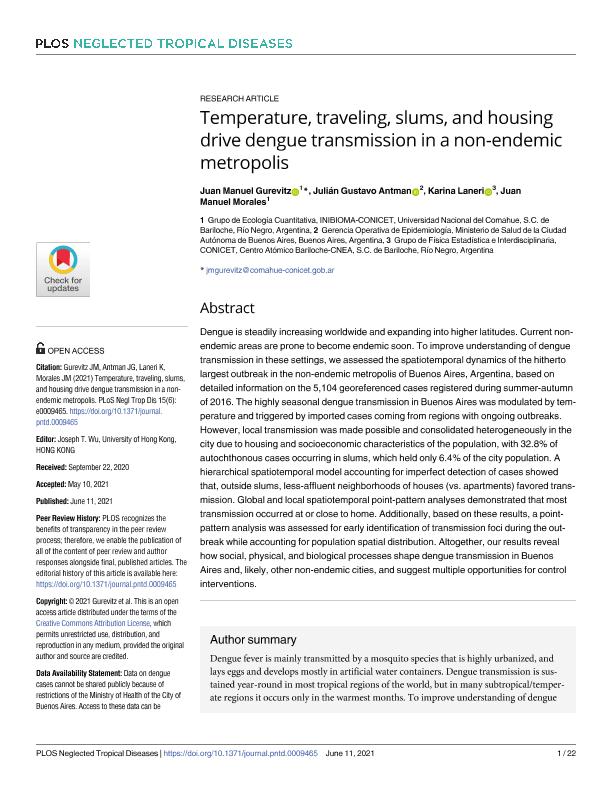Mostrar el registro sencillo del ítem
dc.contributor.author
Gurevitz, Juan Manuel

dc.contributor.author
Antman, Julián Gustavo
dc.contributor.author
Laneri, Karina Fabiana

dc.contributor.author
Morales, Juan Manuel
dc.date.available
2022-05-12T14:58:42Z
dc.date.issued
2021-06
dc.identifier.citation
Gurevitz, Juan Manuel; Antman, Julián Gustavo; Laneri, Karina Fabiana; Morales, Juan Manuel; Temperature, traveling, slums, and housing drive dengue transmission in a non-endemic metropolis; Public Library of Science; Neglected Tropical Diseases; 15; 6; 6-2021
dc.identifier.issn
1935-2735
dc.identifier.uri
http://hdl.handle.net/11336/157357
dc.description.abstract
Dengue is steadily increasing worldwide and expanding into higher latitudes. Current non-endemic areas are prone to become endemic soon. To improve understanding of dengue transmission in these settings, we assessed the spatiotemporal dynamics of the hitherto largest outbreak in the non-endemic metropolis of Buenos Aires, Argentina, based on detailed information on the 5,104 georeferenced cases registered during summer-autumn of 2016. The highly seasonal dengue transmission in Buenos Aires was modulated by temperature and triggered by imported cases coming from regions with ongoing outbreaks. However, local transmission was made possible and consolidated heterogeneously in the city due to housing and socioeconomic characteristics of the population, with 32.8% of autochthonous cases occurring in slums, which held only 6.4% of the city population. A hierarchical spatiotemporal model accounting for imperfect detection of cases showed that, outside slums, less-affluent neighborhoods of houses (vs. apartments) favored transmission. Global and local spatiotemporal point-pattern analyses demonstrated that most transmission occurred at or close to home. Additionally, based on these results, a point-pattern analysis was assessed for early identification of transmission foci during the outbreak while accounting for population spatial distribution. Altogether, our results reveal how social, physical, and biological processes shape dengue transmission in Buenos Aires and, likely, other non-endemic cities, and suggest multiple opportunities for control interventions.
dc.format
application/pdf
dc.language.iso
eng
dc.publisher
Public Library of Science

dc.rights
info:eu-repo/semantics/openAccess
dc.rights.uri
https://creativecommons.org/licenses/by/2.5/ar/
dc.subject
DENGUE FEVER
dc.subject
EPIDEMIOLOGY
dc.subject
AEDES AEGYPTI
dc.subject
SPATIAL ANALYSIS
dc.subject.classification
Ecología

dc.subject.classification
Ciencias Biológicas

dc.subject.classification
CIENCIAS NATURALES Y EXACTAS

dc.title
Temperature, traveling, slums, and housing drive dengue transmission in a non-endemic metropolis
dc.type
info:eu-repo/semantics/article
dc.type
info:ar-repo/semantics/artículo
dc.type
info:eu-repo/semantics/publishedVersion
dc.date.updated
2022-03-11T13:50:47Z
dc.journal.volume
15
dc.journal.number
6
dc.journal.pais
Estados Unidos

dc.journal.ciudad
San Francisco
dc.description.fil
Fil: Gurevitz, Juan Manuel. Consejo Nacional de Investigaciones Científicas y Técnicas. Centro Científico Tecnológico Conicet - Patagonia Norte. Instituto de Investigaciones en Biodiversidad y Medioambiente. Universidad Nacional del Comahue. Centro Regional Universidad Bariloche. Instituto de Investigaciones en Biodiversidad y Medioambiente; Argentina
dc.description.fil
Fil: Antman, Julián Gustavo. Gobierno de la Ciudad Autónoma de Buenos Aires. Ministerio de Salud; Argentina
dc.description.fil
Fil: Laneri, Karina Fabiana. Consejo Nacional de Investigaciones Científicas y Técnicas. Centro Científico Tecnológico Conicet - Patagonia Norte; Argentina. Comisión Nacional de Energía Atómica. Gerencia del Área de Investigaciones y Aplicaciones No Nucleares. Gerencia de Física (cab). División Física Estadística; Argentina
dc.description.fil
Fil: Morales, Juan Manuel. Consejo Nacional de Investigaciones Científicas y Técnicas. Centro Científico Tecnológico Conicet - Patagonia Norte. Instituto de Investigaciones en Biodiversidad y Medioambiente. Universidad Nacional del Comahue. Centro Regional Universidad Bariloche. Instituto de Investigaciones en Biodiversidad y Medioambiente; Argentina
dc.journal.title
Neglected Tropical Diseases

dc.relation.alternativeid
info:eu-repo/semantics/altIdentifier/doi/http://dx.doi.org/10.1371/journal.pntd.0009465
dc.relation.alternativeid
info:eu-repo/semantics/altIdentifier/url/https://journals.plos.org/plosntds/article?id=10.1371/journal.pntd.0009465
Archivos asociados
